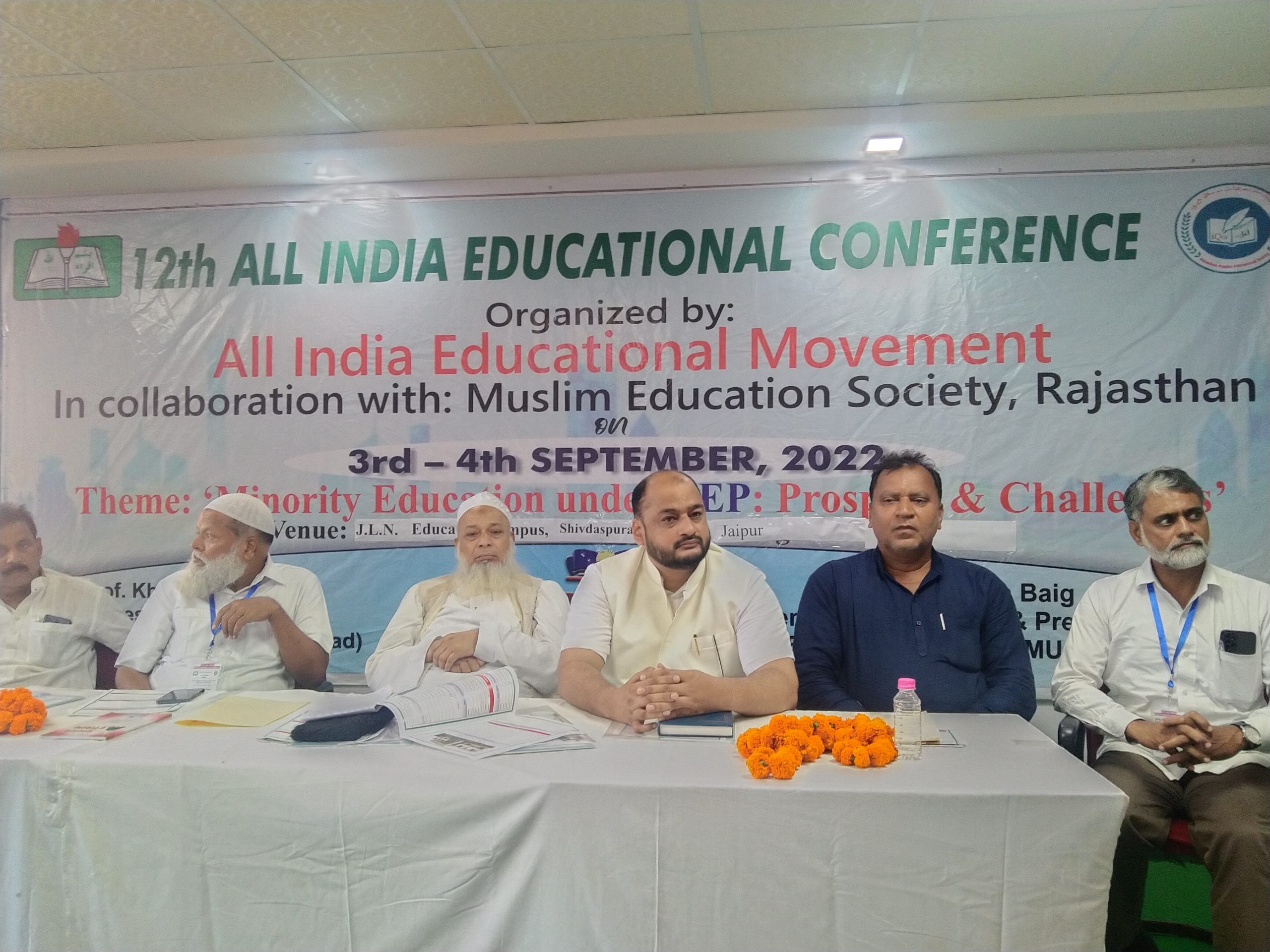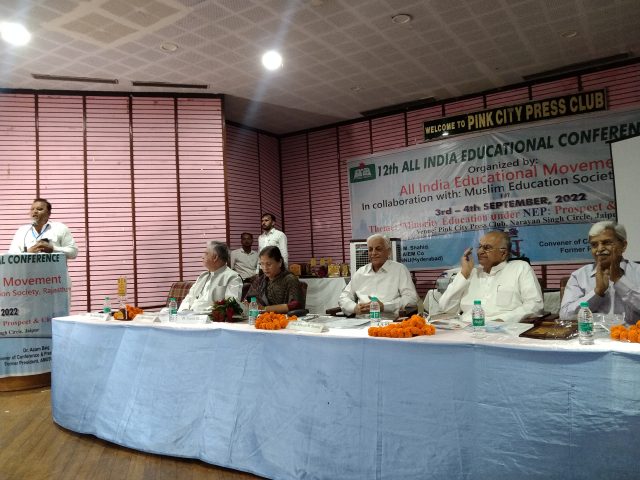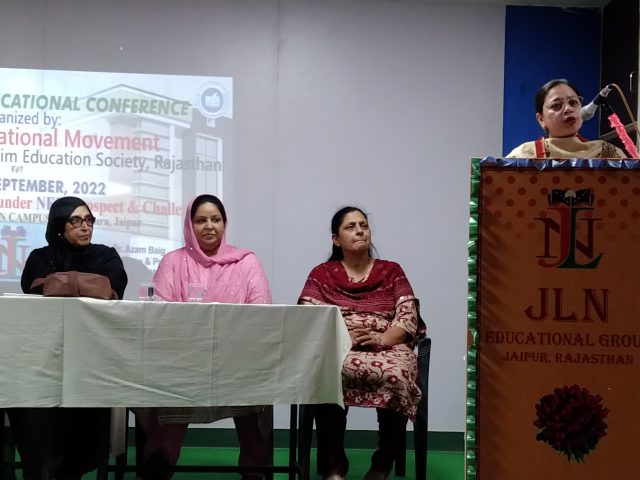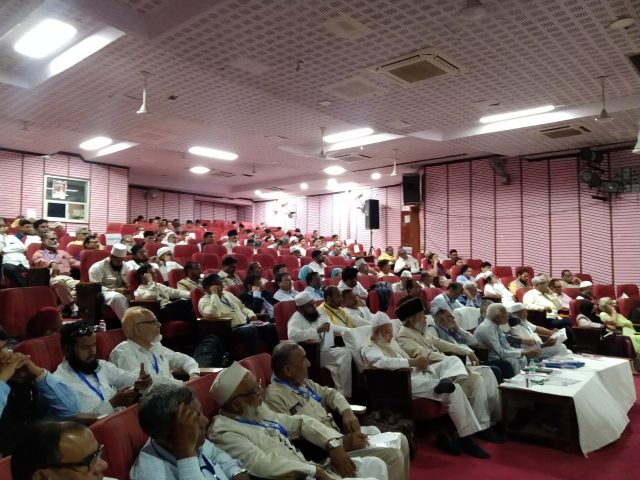
12th All India Educational Conference Passes Resolutions on National Education Policy (NEP) 2020 in Jaipur
By Abdur Rashid Agwan
The successfully conducted 12th All India Educational Conference in Jaipur have unanimously passed several resolutions on National Education Policy (NEP) 2020. The event was organized on the 3rd and 4th of September and attended by hundreds of distinguished scholars, intellectuals, educationists, and academicians from across the country.

12th All India Educational Conference on National Education Policy (NEP) 2020 in Jaipur
The conference delegates broadly discussed and debated the merits and demerits of NEP 2020 and its future impact on the minority and other weaker sections of society.
In two days, several proposals, suggestions, and action plan to make the most of the new education policy were discussed and passed in the form of resolutions to benefit the minorities and the marginalized educationally.

12th All India Educational Conference on National Education Policy (NEP) 2020 in Jaipur
Here is the full text of the resolutions passed at the conference:
We, the delegates of the 12th All India Educational Conference, appreciate the All India Educational Movement and the Muslim Education Society, Jaipur, for jointly organizing the successful event with utmost hospitality and sincerity.
Following two-day-long engaging deliberations, we have arrived at the following resolutions, which are to be taken care of by all concerned for their optimum implementation.
The below-mentioned resolutions are passed with the optimism of making the National Education Policy 2020 a better opportunity for Muslims and other weaker sections of the country despite some elements of concern in the document.
1) National Education Policy 2020 (NEP) released in July 2020, will govern and regulate the Indian education system for about the next three decades. This document will be a foremost reference point after the Constitution and education-related laws for those engaged in the field of education. Hence, educationists, school management, teachers, technical experts, activists, parents, and students should realize its vital importance for the future of education in India and make sincere efforts to actualize its pragmatic goals.

12th All India Educational Conference on National Education Policy (NEP) 2020 in Jaipur
2) The delegates visualize many opportunities in the NEP 2020, such as the concept of cultural diversity in the textbooks, privatization of education, formation of autonomous colleges, the establishment of Special Education Zone, Inclusion Fund, Gender Inclusion Fund, special care of SEDGs including minorities, the flexibility of courses, primary education in the mother tongue, managing madrasa under alternative education system, online learning, the concept of early childhood education through play school and the like. However, these promising aspects can be better availed through awareness, activism, and institutionalized efforts. Hence, the delegates urge all concerned, including themselves, to work to realize these lofty goals of NEP 2020 in the right earnest.
3) The delegates envisage that the NEP 2020 will require enhanced funds to educate weaker sections, including Muslims. Therefore, the community should establish education funds at every level, effectively use Waqf properties for institutional funds, or divert resources from such unproductive use as pompous marriages, etc., to educate children. At the same time, it should effectively avail government scholarships and other schemes through awareness, advocacy, and other useful programs.
4) The delegates understand that for an effective implementation of NEP 2020, a strong mutual cooperation of Socio-Economically Disadvantaged Groups (SEDGs) at different levels is required. Hence, all stakeholders should strive in realizing this cooperation.
5) In the quest to empower Muslim women, the delegates think it proper to recommend to the concerned authorities that the Waqf properties should also be used for district-level Dastkari training centres to empower widows, orphans, and other needy women. These centres can be built through MP & MLA development funds and, with the help of the Department of Minority Affairs or, in its absence, through the Department of Social Welfare.
6) The delegates appreciate the incumbent government of Rajasthan for its efforts to better the education of minorities in the state. They also hope that such efforts will continue earnestly in the future.
7) The inputs of the conference make it evident that future education will be technology-driven, and all community institutions should make due efforts to equip themselves for this upcoming challenge.
8) The potential of the artisan class from within the community has been highlighted at the conference. The delegates believe creative and innovative ways to inculcate various useful and productive skills in youths will go a long way in ameliorating their condition. The need of the hour is all-out efforts for skill development at a mass level. In this regard, all concerned are expected to take due steps.
9) The delegates of the 12th All India Educational Conference suggest and request for the formation of a High-Power Committee of academicians, experts, and activists with a representation, preferably the Chairman local Waqf Board and Member Secretary, to identify suitable Waqf properties for the creation of educational facilities and clear them from commercial exploitation. At the same time, the committee will work in the direction of making all India scholarships accessible to needy and deserving students.
10) There is a pressing need for training programs for the large number of students coming out of Madaris-e-Deeni to prepare them to face the modern/contemporary world.
11) The delegates also underline the importance of proper information regarding government policies, budgets, and schemes for minorities’ welfare. In addition, timely data from the government is also vital for effectively planning and implementing educational policies in the community.
12) The delegates also feel that NEP 2020 contains some ambiguous cultural terms and ignores a historical continuum of educational traditions. It appears to impose a particular set of educational principles while ignoring their negative outcomes in the past. Therefore, delegates call for due care during the NEP 2020 implementation so that such terms are well interpreted in the wake of the nation’s cultural and religious diversity.
13) The delegates suggest to the host organizations and other platforms to generate wider awareness regarding NEP 2020 at the state and district levels so that its benefits are widely availed even by the marginalized at the lowest strata of society.
